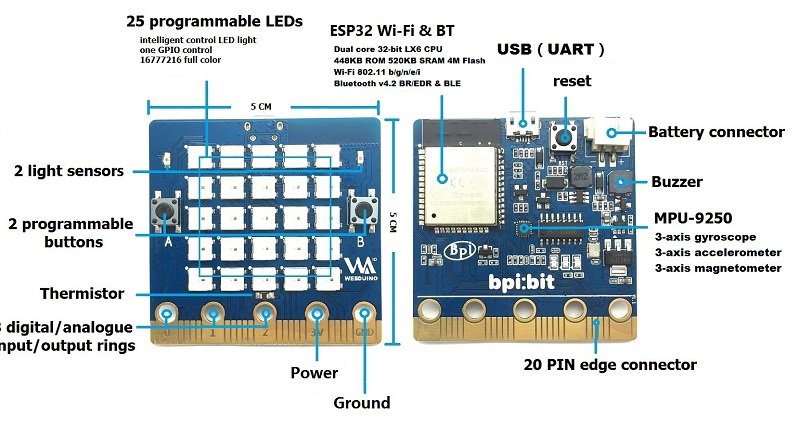In this article I will look at a new board (for me anyway) called the bpi:bit.
So what exactly is this board, well this basically looks like a slightly bigger micro:bit which has an ESP32 fitted to it. So I was immediately interested in this board. First of all lets look at an image of this bad boy which shows many of the features of this board.

webduino:bit
About the board
The board is 5 cm × 5 cm which makes it slightly bigger than a micro:bit which comes in at 5 cm × 4 cm.
As stated earlier it has an ESP32 module with Xtensa 32bit LX6 single/dual-core processor with 448KB ROM and 520 KB SRAM. It also uses a MPU9250 which combines an accelerometer and magnetometer sensor, 2.4G WiFI, Bluetooth and USB connectivity, a display consisting of 25 RGB LEDs, two programmable buttons, and can be powered by either USB or an external battery pack. The device I/O uses the same edge connector as the micro:bit.
The board provides a wide range of onboard resources as you can see in the image above, it has two photosensitive sensors, digital triaxial sensor, digital compass, thermistor. The bpi:bit has 25 intelligent control LEDs which are controlled by just one pin .
So as you can see there are a few features here which are not available on the micro:bit – 2 LDRs, a proper temperature sensor, better LEDs and a better sensor in the MP9250. On top of this the ESP32 has many better features than the NXP KL26Z 32bit ARM Cortex.
Connectivity
Since it uses an ESP32 rather than a NXP KL26Z 32bit ARM Cortex which the micro:bit uses this means as well as bluetooth connectivity you also get 802.11 b/g/n/e/i wifi connectivity.
This is potentially a huge advantage opening up the board to more IoT related development and projects.
Development
The board supports the Webduino, Arduino, MicroPython as well as the Scratch X programming environments.
Since this is a Micropython site we will be focusing on that development environment with code examples and looking at an editor you can use
Micro:bit compatibility
Since this has the same edge connector this means that there are several excellent add on boards that can be easily fitted and used, I’ll be introducing and testing these on this site in future articles.
The pin functions are the same as the micro:bit as well
Cost
This board will cost you $19.95 – Banana PI Bit board with EPS32 for STEAM education




